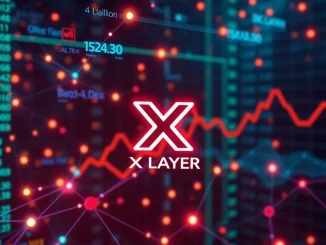
The world of finance is buzzing with news of Noah, a new stablecoin startup making waves right from its inception. Co-founded by Thijn Lamers, a former executive at the major payment company Adyen, and Shah Ramezani, previously an analyst at banking giant UBS, Noah has burst onto the scene with significant backing. This venture into the burgeoning digital asset space is fueled by substantial fintech funding, signaling strong investor confidence in their vision for the future of payments.
Who is Noah, the New Stablecoin Startup?
Noah is the brainchild of seasoned professionals from traditional finance and payments industries. Thijn Lamers brings valuable experience from his time at Adyen, a company known for handling online, mobile, and in-store payments globally. Shah Ramezani’s background at UBS provides a solid foundation in financial analysis and markets. Their combined expertise positions Noah to bridge the gap between traditional financial systems and the innovative potential of digital currencies.
The core idea behind Noah is to leverage the stability and efficiency of stablecoins – cryptocurrencies pegged to stable assets like the US dollar – to improve how money moves globally.
Fueling Growth: The $22M Fintech Funding Round
Noah’s ambitious plans received a major boost with a successful seed funding round that secured an impressive $22 million. This significant early-stage investment was led by European venture capital firm LocalGlobe. Additional support came from prominent investors such as Felix Capital, FJ Labs, and others.
This level of seed funding is substantial for a new venture and highlights investor belief in Noah’s team and its potential market. It provides the necessary capital for Noah to build out its technology, expand its team, and pursue its goal of transforming global payments.
How Noah’s Crypto Payments API Works
At the heart of Noah’s offering is a crypto payments API (Application Programming Interface). This API is designed to allow businesses and potentially individuals to easily integrate stablecoin-based transactions into their existing systems. Think of it as a set of tools and protocols that make it simple for different software applications to communicate and perform payment functions using stablecoins.
Key features and benefits of using such an API include:
- Real-Time Transactions: Unlike traditional banking transfers that can take days, stablecoin transactions can settle in near real-time, 24/7.
- Reduced Costs: Leveraging blockchain technology and stablecoins can potentially lower transaction fees compared to traditional cross-border wire transfers.
- Increased Efficiency: Automating payments through an API can streamline financial operations for businesses.
- Global Reach: Access to a network that operates globally without relying on fragmented national banking systems.
By providing this API, Noah aims to lower the technical barrier for companies wanting to use stablecoins for payments.
Addressing Cross-Border Payments Challenges
One of the most significant pain points Noah aims to address is the complexity and cost of cross-border payments. Sending money across international borders using traditional methods is often slow, expensive, and involves multiple intermediaries, each adding fees and delays.
Noah’s stablecoin-based solution offers a potential alternative:
| Feature | Traditional Cross-Border Payment | Noah Stablecoin Payment |
|---|---|---|
| Speed | Days | Near Real-Time |
| Cost | Often High Fees & Markups | Potentially Lower Fees |
| Complexity | Multiple Banks & Intermediaries | Streamlined via API |
| Availability | Limited Banking Hours | 24/7 |
The ability to facilitate real-time transfers across 70 countries using stablecoins is a direct challenge to existing remittance and international business payment systems. This broad coverage suggests Noah is targeting a significant portion of the global payments market from the outset.
What Does This Mean for Noah Stablecoin Adoption?
The success of Noah will depend heavily on the adoption of its platform and, by extension, the stablecoins it utilizes. While the article doesn’t specify *which* stablecoins Noah will use, the model relies on the inherent advantages of these digital assets.
Factors that could influence the adoption of the Noah stablecoin (or the stablecoins powered by Noah’s API) include:
- Regulatory Clarity: The evolving regulatory landscape for stablecoins will play a crucial role.
- Ease of Integration: How simple and effective is their API for businesses to implement?
- Network Effects: As more businesses and users adopt the platform, its value increases.
- Competition: The space for stablecoin payments is becoming increasingly competitive.
The backing from reputable VC firms and the experience of the founding team are strong indicators that Noah is well-positioned to navigate these challenges and push for wider adoption.
Summary
Noah, a new stablecoin startup co-founded by former executives from Adyen and UBS, has successfully raised $22 million in seed fintech funding. The company is launching a crypto payments API aimed at facilitating real-time cross-border payments across 70 countries using stablecoins. This development represents a significant step in leveraging digital assets to solve long-standing issues in global finance. With experienced leadership and substantial early investment, Noah is poised to become a notable player in the evolving landscape of Noah stablecoin-powered payments.



